Finding A Fit With Biopesticides
Sponsored Editorial
Growers are, by nature, stewards of the earth. They have to be; their livelihoods depend on it. To harm the soil they rely on each year for healthy crops would just be bad farming. Luckily, softer products, including biopesticides, have emerged as valuable tools growers can use in their strides toward sustainability. But the benefits of these products are far reaching, not just environmentally, but from a business standpoint, as well.
Safe Picking
Growers who run U-Pick operations are very familiar with advantages like short re-entry and preharvest intervals that come with the use of biopesticides. Craig Underwood, owner of Underwood Farms in Moorpark and Somis, CA, says biopesticides are extremely beneficial in the smooth operation of his U-Pick fields. Underwood Farms grows numerous crops for U-Pick, including strawberries, blueberries, raspberries, and blackberries. For safety, Underwood says he first makes sure regulations enforced by the state are strictly followed, but just as important, he adds, is using softer products, including biopesticides.
“We focus on pesticides that have a very short re-entry period and days to harvest. With some of the materials we use, you can enter the field within four hours after spraying,” he says. “We don’t want to use a material that requires us to have to keep people out for three or four days at a time.”
AgraQuest director of global marketing Sarah Reiter says growers often opt for biopesticides just for that reason. “Many biopesticides have the shortest re-entry intervals, meaning you can spray and get people back into that field four hours later,” she says. “You can really be confident in a U-Pick situation when your customers are out doing what they want to do and at the same time, you are able to make the applications you need to make in order to keep the crops healthy.” Plus, it’s safer for workers in the field, too.
Residue Levels And Exports
Biopesticides have benefits for growers who export their produce, as well. Consumers’ concern about pesticide residues on their fruits and vegetables has led to maximum residue levels (MRLs) being lowered significantly, especially in markets like Europe. According to Reiter, customer demand for pesticide-free produce has gone so far that some food retailers are even competing with each other based on zero residue claims. These increasingly stringent regulations mean growers who export their crops need to be even more vigilant about what they’re spraying and when.
For these growers, biopesticides can be an excellent choice. Because most biopesticides are exempt from residue limits, they are safe to use very late in the season, even when shipping to foreign markets. Reiter says there is often a long lag between the time a conventional chemistry is introduced to the time local governments set their MRLs. “A grower can be using an application that is legal here, and legal if that crop was going to one of 50 other export countries, but if he exports to that one country that hasn’t yet set an MRL, all of a sudden his crop is sitting, aging dockside while they are trying to negotiate a way to get that crop into a foreign market,” she says. “Growers can avoid that entire headache if they use biopesticides, particularly late in the season.”
Harold McClarty of HMC Farms in Kingsburg, CA, which exports peaches, plums, nectarines, and grapes all over the world, is just one grower who employs biopesticides alongside conventional chemistries as part of an integrated pest management program. “The price of the product or chemical isn’t as relevant as the safety or softness of the chemical,” he says. “We have quite a protocol of making sure that we use the softest chemical we can use to get the job done, regardless of cost.”
And that’s not just because foreign markets demand it, he adds. “It’s the domestic market, too,” he says. “There’s a responsibility we have to be as safe as we possibly can.”
To learn more about biopesticides, visit www.biopesticideindustryalliance.org.










